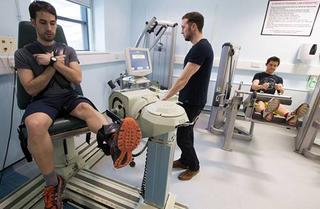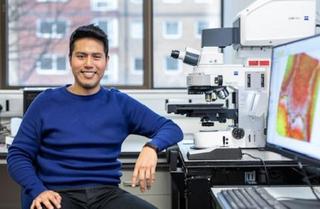Study Biochemistry abroad
Biochemistry is the study of all living things at a cellular, molecular, and atomic level to understand the biological processes and functions that govern life. This field is research intensive and explores new applications to understand and improve life.

$94,270: median annual wage for biochemists and biophysicists

5% project employment growth for biochemistry professionals

3,200 openings projected every year in Biochemistry field

Higher job satisfaction than 56% other careers
About Biochemistry
Biochemistry has three major branches:
Structural Biology overlaps with molecular biology and biophysics as it moves to understand the structure of biological macromolecules and their functions. Structural biologists have made significant contributions towards understanding the molecular components associated with Alzheimer's disease, Parkinson's disease, and type II diabetes.
Enzymology is the study of enzymes. Developing an understanding of how these biological catalysts affect chemical reactions allows us to understand the relationship of different chemical groups. Enzymes are used in the chemical industry and other industrial applications when extremely specific catalysts are required.
Metabolic biochemistry is the field in which the life-sustaining chemical reactions taking place inside an organism are studied: the conversion of the energy in food to energy available to run cellular processes.
Is Biochemistry right for me?
Biochemistry study options and cost

Another popular destination for studying biochemistry is the United Kingdom. The average annual cost of studying biochemistry in the UK for an international student is £39,010 per annum. UK’s world renowned Oxford University houses the largest biochemistry department in Europe. The university’s 4-year undergrad program is renowned for cultivating some of the most outstanding biochemists in the world.
Japan is also a popular destination for a degree in biochemistry, because of its experimental focus and state-of-the-art laboratories. The country is considered a powerhouse in biochemistry research. Students can apply to top universities like the University of Tokyo, Kyoto University, and Tohoku University. The average cost of a biochemistry degree in Japan is $12,000 per annum.
Future outlook
Career pathways for Biochemistry graduates

Biomedical scientists
Biomedical scientists are responsible for better understanding, diagnosing, treating and preventing human diseases. They not only study the human body and gain knowledge of how it works, but are responsible for finding new ways to cure or treat diseases.
Microbiologists
Microbiologists study microorganisms such as bacteria, viruses, algae, fungi, and some types of parasites. Microbiologists work in laboratories and offices, where they conduct scientific experiments and analyze the results.
Biotechnologists
Biotechnologists create and improve products and processes for agriculture, medicine and conservation using biological organisms. They study the genetic, chemical and physical attributes of cells, tissues and organisms, and identify industrial uses for them.
Academia
Research opportunities abound in biochemistry. In addition, there are lots of career opportunities in academia for biochemists to impart their knowledge to the next generation of biochemistry professionals. Most biochemistry academics are involved in both teaching and research work simultaneously.
提供的獎學金
-
At University of Surrey ISC - Study Group UK

Guildford , United Kingdom

資格
Pathway to UG

資助類別
Fee waiver/discount
-
At University of Birmingham

Birmingham , United Kingdom

資格
Undergraduate

資助類別
Free products/services
-
At University of Leeds

Leeds , United Kingdom

資格
Undergraduate

資助類別
Fee waiver/discount







我們開始吧!
一鍵註冊或登入
檢視清單 或關閉此視窗以繼續搜尋